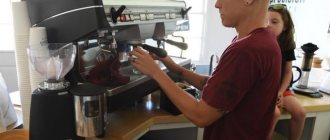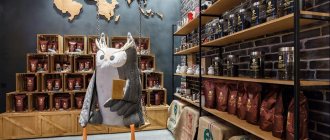Having opened his own coffee shop, every entrepreneur is faced with the need to hire staff. The first specialist needed is a barista. What skills and knowledge must a professional barista have in order for a coffee shop to operate successfully? What personal qualities should a professional have and is it worth hiring newcomers?
What should a barista know and be able to do?
Relatively recently, the term barista has appeared among new words. Literally translated from Italian, this means working behind the bar.
It is important for any coffee shop to have an experienced barista who must:
- be able to distinguish different types of coffee beans;
- know how and under what conditions coffee is grown;
- what methods are used when collecting and processing grains;
- understand the degrees of roasting;
- be able to distinguish the aromas and tastes of a drink;
- know how to store ground and bean coffee;
- be able to choose the right grind;
- prepare coffee using any equipment;
- apply various technologies and standards in preparing a coffee drink.
In addition to the ability to operate coffee machines and knowledge in the field of coffee, you need to serve the client well. The drink must be served correctly and, if necessary, the barista must be able to explain to the customer how this drink differs from others.
A professional will be able to correctly select the utensils for serving coffee, and the espresso barista can also decorate the drink by depicting any design on the foam. Not all coffee brewers have these skills.
About the profession
A barista specializes in creating different types of coffee. He also prepares other drinks that are created on its basis. While working, the barista uses various types of equipment. In particular, we are talking about special coffee machines. So-called grinders and special steam generators.
In addition to the fact that the barista must prepare delicious coffee, he must decorate it beautifully. In order to subsequently submit it to your client.
What does barista mean?
Barista is an Italian word. Translated, it means a specialist who stands behind the bar. At the same time, the current formulation is not suitable for the specialty. Because it doesn’t reflect the essence of what a barista does.
A barista's only specialty is interacting with coffee. Cook and serve it. However, in the CIS countries, a barista can not only prepare coffee, but also have related responsibilities. For example, he can wash dishes (coffee cups). And also serve coffee to visitors of the establishment.
A barista must be able to prepare many types of coffee
There are a huge number of types of coffee in the world. In addition to the standard ones (Americano, cappuccino, latte), there are also exotic ones. The barista should know the recipes for most of these types of coffee.
A specialist must have a perfect understanding of his field. He must know how to interact with grains. How to dry them and store them. And also how they should be fried. And grind.
A barista must know a specific number of coffee recipes. Usually - at least forty. In addition to the fact that the barista must know the recipes, he must also be able to prepare coffee according to them. So that it turns out delicious and lifts the mood of customers.
The barista must be a subtle psychologist
The barista must have psychological skills. He must feel people. Understand what type of coffee they need at one time or another. This skill will be useful if the client comes to a coffee shop or restaurant and does not know which option to choose.
The barista must be able to use the equipment
Without the appropriate equipment, a barista is unlikely to be able to make delicious coffee. To master a profession, a teenager will have to learn to use different types of equipment. In particular, a coffee maker, a so-called pitcher (this is a special type of container into which milk is poured) and a coffee machine. Also, the teenager will have to master a tool called a grinder (this is a special coffee grinder).
Just knowing how to use instruments is not enough. The teenager will have to use certain tools professionally. To make coffee efficiently.
The barista must understand the types of coffee
A barista must have extensive knowledge of his specialty. He must understand how certain devices work. He must understand coffee terminology. Understand what types of grains there are. And also what types can be used to prepare certain types of coffee.
Also, the specialist must understand the technical side of the issue. He must understand how various factors influence the taste and smell of coffee. In particular, grinding, as well as roasting and the temperature of the water used to prepare this or that type of coffee.
About barista education
There is no narrowly focused specialty in which baristas can be trained professionally. However, a teenager can master a standard education, which will be useful when working in this area. In particular, recommend that your teenager graduate from college or university with a degree in “Waiter, Bartender.” Also, a teenager can master any other specialty that is in one way or another related to public catering.
In large cities you can find private barista courses. Sometimes they are held by various large cafes and restaurants. You have to pay money so that your teenager can study here. However, the result will please you. A teenager will be able to get a promising profession in which he can earn a sufficient amount of money.
All courses offered to teach the barista profession are private. Be sure to read reviews about them on the Internet. This will allow you to understand what courses you should send your teenager to. And which ones will not bear fruit. And the teenager will simply waste time and money.
How much does looks and charisma mean to a barista?
For the client, the charisma and appearance of the person serving him plays an important role. The barista must look good and be able to establish contact with the visitor. Who should act as a barista, a woman or a man? It is impossible to give a definite answer here. Male customers will be happy to see an attractive girl behind the counter, but their female companions may not like it.
If a man makes coffee, it is easier for him to carry on a conversation with a visitor, which can lead to an increase in visitors. In any case, be it a girl or a guy, they must be professionals in their field.
Start your day right
Your work ethic is what makes you not just a good barista, but the best. Customers love a pleasant and positive atmosphere and also appreciate good service.
If you find that you lack enthusiasm, think about what you can change. Are you tired because your regular shift is at an inconvenient time for you? Consider whether it is possible to swap shifts with someone else. Do you get bored or feel limited in your role? Engage in professional development or talk to your manager about taking on more responsibilities and duties.
Start each day thinking that it would be nice to practice your skills or learn new ones. Be open to learning from your peers so you never stop growing as a barista.
Requirements for a barista when hiring
When hired, a barite must be able to demonstrate his skills, namely:
- have aesthetic and artistic abilities;
- be able to make various combinations of available coffee varieties;
- have at least 40 recipes for preparing the drink, including classic options: cappuccino, espresso, Americano;
- pay attention to the equipment: put it into operation, clean it, do preventive maintenance;
- be able to work in ambiguity mode - during working hours, the barista focuses on the pressure of the coffee machine, water temperature, safety of fillers, degree of grinding, readiness of all coffee options;
- be sociable and friendly, since tips are an important factor.
For you:
What technical requirements must be met when opening a coffee shop
What responsibilities does a barista have?
The main responsibilities that baristas have are the following:
- A specialist must know a huge number of recipes (about forty) and be able to prepare them. To effectively create different types of coffee, a teenager needs to be able to change the grind level. Adjust the pressure in the device. Increase and decrease the level of coffee in a particular type of drink. Be able to tamp coffee with different forces. Know how to froth milk. And so on. The specialist must ideally have all the technical aspects related to coffee preparation in one way or another.
- The specialist must understand different types of coffee. He must know the types and types of grains. He must understand how the fact of where and when the crop was harvested can affect the taste of the coffee. It should differentiate between different roast levels. He must know the type of grinding he needs. And also understand a number of other important characteristics taken into account when preparing coffee.
- A specialist must be able to distinguish coffee according to a number of parameters. According to its taste, as well as smell, shade and consistency.
- The specialist must be able to interact with milk when preparing coffee. He must be able to use milk foam. Also, he should have good coffee drawing skills. To create the design, the teenager will need to pour coffee using milk using a special technology. So, thanks to this, various patterns will be formed on it. These skills also need to be mastered additionally.
- The specialist must be an extrovert. He must be able to communicate with visitors. Be welcoming and friendly. If the establishment has regular customers, then the specialist must remember what they like. And what exactly do they prefer to drink? Sometimes he can put on a little show while making coffee. To entertain visitors.
Is it worth hiring an inexperienced barista?
If a candidate without experience is hired, then you need to be prepared that it will take some time to train him. And then practice, which is gained in the process of work. At first, a newbie will not have high quality and speed of service. The coffee business cannot avoid this.
In the future, the employee may leave the establishment for various reasons. To prevent this, when applying for a job, you should draw up a contract and specify the conditions in it.
It should be borne in mind that young specialists are very vulnerable due to their inexperience and uncertainty, so you need to show tact and patience towards a newcomer. If his resume says stress-resistant, this does not mean that he can handle all stressful situations.
For a barista to grow into a professional, it takes the efforts of not only the beginner, but also the cafe manager and the entire team.
But, there is every chance to get your own coffee bartender, who will be trained for a specific establishment. With his eyes closed he will be able to navigate the cafe, because from the very beginning he knows where everything is. Can easily find replacements for ingredients that are temporarily unavailable. It grows and develops along with the business and forms a single whole with it.
If you don’t want to waste time training a new person, then you can hire a professional. Such a person will be able to independently adapt to the specifics of the establishment, but will find an approach to the guests. In addition, he has many ideas that can be brought to life. But here it should be remembered that such a person works as long as he is interested. Once interest wanes, the cafe may lose an employee.
Therefore, in order to retain a professional, you need to create conditions for self-improvement.
As you can see, there is no clear answer whether or not to take a newcomer to your team. Each leader makes this decision independently. However, we must remember that the main thing is not only to find a barista, but also to retain him.
For you:
Financial model for coffee business
Creation of a training department
Large coffee chains usually have offices where personnel and organizational issues are resolved. In such an office, space is allocated for installing a coffee machine and coffee grinder for training new employees. After passing the interview, the employee studies in this room for several days under the guidance of a special barista trainer. Next, the new employee undergoes an internship for some time at already operating outlets. If the internship is successful, the applicant is finally hired.
In such coffee shops, high demands are placed on barista trainers, since the initial skills of all new baristas depend on their skills and ability to train.
Where to study
There are different ways to become a coffee bartender:
- through the barista union;
- bartenders association;
- through special accredited organizations;
- with the help of training centers from various companies specializing in the coffee and restaurant business.
You can also get an education abroad. In England there is the London School of Coffee, in America there is “roasted gossip”, etc.
Any training consists of two parts: theory and practice.
During theoretical classes, the student learns about the history of the origin of coffee, its varieties, methods of preparation, etc. More time is devoted to practice. The student learns to make different types of drinks. The training is conducted by experienced professionals and does not leave any of the students unattended. Upon completion of training, exams are passed and the new barista receives a diploma confirming that he has been assigned the appropriate qualification.
Duration and features of training
To gain basic knowledge about coffee and practical skills in handling equipment, 2-7 days are enough. More in-depth training will take 10-15 days. In general, of course, the period depends on the level of the coach. At the end of the course, not every barista will become a first-class specialist; it is impossible to achieve such a goal in such a short time. I think it won’t be easy to achieve this even in a month. But students will definitely receive an understanding of the subject and effective tools for further development of skills in the chosen direction. And then the main thing is practice, practice and more practice!
Why is everything like this? A concentrated program allows you to gain knowledge without taking too long a break from work. This is convenient for business owners. Another significant advantage is that you can choose in which block and at what level you want to study. For example, for a barista who wants to grow into a chef, the following set will be relevant: “Barista skills” and “Brewing” up to the “Professional” level, necessarily “Sensory skills” up to the “Intermediate” level, the basics of “Roasting” and “Green coffee” . For a coffee lover - “Introduction to coffee”, “Brewing” and “Sensory skills” at the “Fundamentals” level. A coffee business owner can take “Introduction to coffee” and “Sensory skills” up to the “Intermediate” level, as well as modules that are relevant to his project.
Based on the experience of the Barista Academy, we can say that learning professional skills seriously is not easy work. Of the 20 students in the course, less than half reach the end. The combination of concentrated theoretical and practical work requires complete dedication. During the classes, students learn all kinds of drink preparation techniques, work with different types of coffee machines, get acquainted with cupping methodology, and understand the basic concepts of sensory analysis. Great attention is paid to practice, so it is impossible to do without a properly equipped site.
How much pay
A barista’s income depends on his skills, the ability not only to prepare a drink, but also to serve it. At the initial stage, the salary is from 8 thousand rubles. up to 10 thousand rubles People with experience receive from 25 thousand rubles to 50 thousand rubles.
And professionals are already claiming a payment of 100 thousand rubles.
For comparison. In America, a barista earns from $8 to $12.5 per hour. This does not include tips. Together with them, the annual income can reach 18-30 thousand. In addition, when concluding a contract, the specialist is offered bonuses, health insurance and other incentives. Unscheduled work is paid at double the rate.
Frothing milk makes it sweeter.
As the temperature of the milk rises, the lactose becomes more soluble. This is why it makes the sweetness of hot milk more noticeable, which is probably why you loved warm milk when you were a child. But the milk doesn't actually become sweeter, it just increases the perception of sweetness. So when the barista makes you a beautiful espresso with perfect crema, it will taste a little sweeter than if you just added milk to your black coffee.
This also means you don't have to add five tablespoons of sugar to your coffee. Try coffee without sugar. Who knows, you might just be tempted to wean yourself off your bad sugar habit.
Working conditions
Working hours are divided into twelve-hour shifts with a schedule of two days after two or three days after three.
According to sanitary standards, all catering staff must have a health certificate. This rule also applies to baristas. Its registration costs up to 5 thousand rubles.
The work can be done either with a partner or independently. Management constantly monitors work and can arrange an inspection at any time. For violation of discipline, prescription, or appearance, a fine may be imposed.
During lunch breaks you are allowed to drink a cup of coffee, and in some establishments, eat a sandwich.
How to choose grains
Type of bush
There are two types of coffee bushes used for coffee: Arabica and Robusta. Arabica grows on a tree, it has more oval grains, and in coffee based on it there is a pronounced sourness. Robusta grows on a bush, it has rounder dark grains, and the main flavor is bitterness. Robusta is cheaper than Arabica and has more caffeine.
To prepare coffee, you can use 100% Arabica or a mixture of Arabica and Robusta - a coffee blend. One hundred percent robusta is also found, but this is not a drink for everyone - behind its heaviness and bitterness it is difficult to feel the taste of coffee. Specialty coffee is based on Arabica because it is a more sophisticated and refined production.
Geography
Coffee grows in humid tropical climates in soils rich in fertilizers. Depending on the climate, different varieties of Arabica and Robusta grow in different countries. For example, in Central America, the dominant varieties are Caturra and Catuai. They have citrus and nutty notes.
In West Africa, the production of unpretentious robusta is underway. In the East, another Arabica variety grows, bourbon, with floral notes. Coffee from Ethiopia stands apart - it can have the aromas of bergamot or jasmine. In Asia, Robusta was crossed with Arabica to create the Catimor variety, a rich coffee with woody notes.
Each variety and region has its own flavor profile. The only way to find your coffee is to experiment with beans from different countries.
Making good coffee takes time.
I think of coffee as slow food versus fast food. If you ask a barista to make you coffee, do you really need to run somewhere urgently? No, you want to have a good time and enjoy yourself. Otherwise, you could just buy coffee from one of those machines where you press 1 button.
Humor about a barista:
Author: Anna Brones, author of “The Culinary Cyclist” and “Fika: The Art of the Swedish Coffee Break”, founder of “Foodie Underground”. Actively studies the coffee industry.
Source: “8 Things Your Barista Wishes You Knew About Coffee” - the translation is closer to the spirit than the letter.
Coffee dosing
- Holders should always be in the espresso group of the machine to ensure uniform heating;
- It is necessary to grind coffee only immediately before preparing espresso. No pre-ground coffee in the hopper!
- Before grinding a portion of coffee into the holder, it must be wiped clean and dry from the inside.
- Always grind the same amount of coffee into the holder (after adjusting the grinding).
- Always grind coffee into the holder evenly (a mound of coffee in the center of the holder).
- You should grind coffee into the holder without loss.










